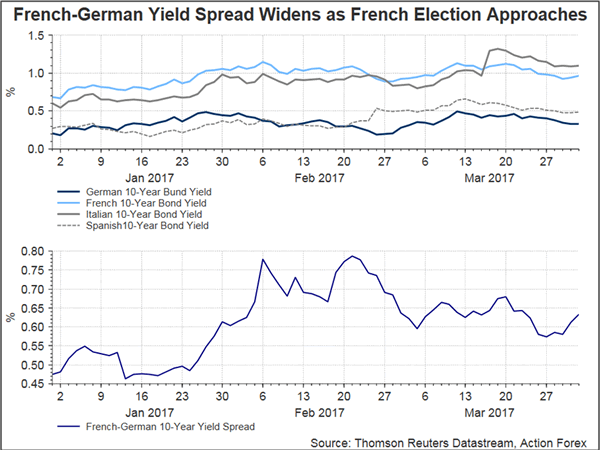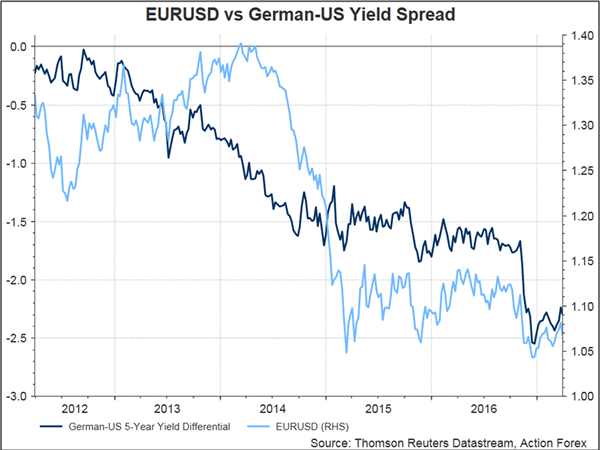EURUSD selloff from this year’s high of 1.0904 appears to have stabilized. The weakness was probably contained by ECB Chief Economic Peter Praet’s comments that "the probability" to "provide more monetary accommodation to meet our objective has reduced considerably". He stressed, however, that the monetary stance remains appropriate and QE reduction "does not signal the start of a gradual reduction of purchases – tapering". We remain cautious over the currency’s outlook which would continue to be driven by two critical factors: 1. Political risks and 2. ECB’s tapering schedule.
French presidential election the most imminent political event
The most imminent political event in the Eurozone is the French presidential election, with the first round taking place on April 23 and the second and final round on May 7. Polls have suggested that centre-left candidate Emmanuel Macron and populist far-right candidate Marine Le Pen would get the most votes in the first round, but then Macron would win the second and final round, and become the next French president. However, this outcome is far from certain. Confirmation of euro-skeptic Le Pen’s failure would be bullish for the euro and European yields as concerns over "Frexit" diminish. The next debate would take place on April 4 with all eleven candidates on stage. The themes to be discussed include employment, security and welfare system.

Italy next…
Italy would return to the spotlight after the French election as snap elections in the country remains a tail risk. Recent surveys suggest that Five Start Movement, a populist euro-skeptic political party have surged in support. The latest opinion poll by EMG shows that support for the party rose to 30%, compared with the ruling Democratic Party’s 30%. The market has priced in little chance of "Italexit". In the unlikely event that this happens, the euro would suffer another round of selloff.
ECB guidance watched
Euro’s selloff last week was driven by a report noting that the market had misinterpreted ECB’s tapering intention and the central bank was now wary of making further changes to its policy guidance in the coming meeting. As we mentioned in a previous report, we expect ECB’s monetary policy and QE measures to stay the same throughout the year. That is, ECB should keep the main refi rate, marginal lending rate and the depo rate 0%, 0.25% and -0.40%, respectively. Meanwhile, the central bank would continue the asset purchase program at the pace of 80B euro per month until the end of this month and then continue the program at a pace of 60B euro per month from April 2017 until the end of December 2017, or beyond, if necessary. QE tapering would likely begin in early 2018 and end by the first half of the year. ECB might begin raising the depo rate in 2Q18. Every ECB meeting would be closely watched as the market gauges whether the central bank has change its rhetoric on the monetary policy and stimulus measures.

Key Events in Eurozone
| April 23 | First round of the French presidential election |
| May 7 | Second round of the French presidential election |
| June 11 | First round of the French legislative election |
| June 18 | Second round of the French legislative election |
| July 17 | 2 billion euro redemption of bonds issued by Greece to private investors |
| July 20 | 4 billion euro redemption of bonds held by ECB/Eurosystem exempted from the 2012 default |
| September 24 | German federal election |
